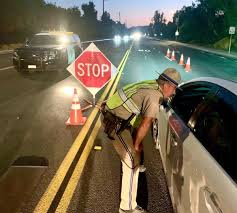
One common method law enforcement uses to catch DUI offenders is through DUI checkpoints. However, being stopped at a checkpoint and subsequently arrested does not mean you’ll automatically be convicted. Understanding the legal framework surrounding DUI checkpoints, along with your rights and potential defenses, is crucial for Huntington Beach DUI lawyers and defendants facing charges from a DUI checkpoint arrest.
Understanding DUI Checkpoints
DUI checkpoints are sobriety checkpoints set up by law enforcement to deter and identify drunk drivers. They are considered legal in California and are regulated under Vehicle Code Section 2814.2 (VC 2814.2), which allows officers to briefly stop drivers to check for signs of impairment. Section 2814.2 reads:
(a) A driver of a motor vehicle shall stop and submit to a sobriety checkpoint inspection conducted by a law enforcement agency when signs and displays are posted requiring that stop.
(b) Notwithstanding Section 14602.6 or 14607.6, a peace officer or any other authorized person shall not cause the impoundment of a vehicle at a sobriety checkpoint if the driver’s only offense is a violation of Section 12500.
(c) During the conduct of a sobriety checkpoint, if the law enforcement officer encounters a driver who is in violation of Section 12500, the law enforcement officer shall make a reasonable attempt to identify the registered owner of the vehicle. If the registered owner is present, or the officer is able to identify the registered owner and obtain the registered owner’s authorization to release the motor vehicle to a licensed driver by the end of the checkpoint, the vehicle shall be released to either the registered owner of the vehicle if he or she is a licensed driver or to the licensed driver authorized by the registered owner of the vehicle. If a notice to appear is issued, the name and driver’s license number of the licensed driver to whom the vehicle was released pursuant to this subdivision shall be listed on the officer’s copy of the notice to appear issued to the unlicensed driver. When a vehicle cannot be released, the vehicle shall be removed pursuant to subdivision (p) of Section 22651, whether a notice to appear has been issued or not.
During these checkpoints, officers may ask drivers a series of questions to gauge sobriety, and if they suspect a driver is under the influence, they may perform a field sobriety test or a breath analysis. Despite their legality, DUI checkpoints must adhere to specific legal requirements to ensure they do not violate constitutional protections against unlawful searches and seizures.
Legal Requirements for DUI Checkpoints

For a DUI checkpoint to be legally valid, it must meet several criteria:
1. Supervisory Decision: The checkpoint must be established and operated under a supervisory decision, rather than by officers in the field.
2. Reasonable Location: The site must be a reasonable location, often selected based on areas with a history of DUI incidents.
3. Time and Duration: The operation must be conducted during reasonable times and for a reasonable duration.
4. Neutral Formula: There must be a neutral formula used for stopping vehicles, such as every third car.
5. Safety Precautions: Adequate safety measures must be in place to protect both officers and motorists.
6. Visible Indications: The checkpoint must have visible signs of being an official DUI stop, with clear warnings for approaching drivers.
7. Minimal Intrusion: Stops must be conducted with minimal inconvenience to drivers.
If these standards are not followed, there might be grounds to challenge the legality of the checkpoint and any subsequent arrest made at that location.
Common Defenses Against a DUI Arrest at a Checkpoint
If you are arrested at a DUI checkpoint, it’s important to consult with an Orange County DUI lawyer who can assess your case and potentially challenge the arrest based on several defense strategies:
1. Challenge the Legality of the Checkpoint: If the checkpoint failed to meet legal requirements, this could be a basis for contesting the DUI charge. A DUI attorney will investigate if there was noncompliance with the established protocols outlined in VC 2814.2.
2. Question the Evidence of Impairment: The evidence used to establish impairment might be faulty or improperly obtained. Your Huntington Beach DUI attorney will point out, for instance, that field sobriety tests are subjective and can be influenced by other factors such as fatigue, medical conditions, or even weather conditions.
3. Breathalyzer Reliability: The accuracy of breathalyzers can sometimes be questioned. Factors such as calibration issues or improper use by law enforcement personnel can lead to inaccurate results. If the machine was not properly calibrated or maintained, your Huntington Beach DUI lawyer may be able to exclude that evidence.
4. Procedural Errors: Mistakes in the arrest process or violation of your rights during the checkpoint stop can form the basis for a strong defense.
5. No Probable Cause for Arrest: If the officers did not have probable cause to believe you were impaired, your Orange County DUI lawyer might be able to get the case dismissed.
Penalties Incurred from a DUI Conviction
Despite the defenses available, being convicted of a DUI is associated with severe penalties. A first-time offender faces fines, suspension of driving privileges, mandatory alcohol program, and even time in the Orange County jail. Repeat offenders or those who caused harm while driving under the influence face increasingly harsher penalties, including longer jail sentences, more extensive DUI programs, and larger fines.
Additionally, a DUI conviction comes with long-term consequences such as increased insurance premiums, a criminal record, and potential challenges with employment opportunities.
The Role of an Orange County DUI Lawyer

Navigating the complexities of a DUI charge requires professional legal guidance. An experienced Orange County DUI lawyer can play a pivotal role in defending DUI charges by:
– Evaluating the evidence and identifying weaknesses in the prosecution’s case.
– Filing motions to suppress evidence obtained through unlawful means.
– Negotiating plea agreements or reductions in charges when appropriate.
– Representing you in court, prepared to challenge the legality of the checkpoint and the arrest procedures.
Having knowledgeable legal representation ensures your rights are protected and increases the chance of a favorable outcome, whether that means reduced charges, lesser penalties, or a complete dismissal of the case.
Conclusion
While DUI checkpoints are a lawful tool used by California law enforcement to combat impaired driving, they must operate within established legal boundaries designed to protect motorists’ rights. If you find yourself facing a DUI arrest following a checkpoint stop, understanding these regulations and how they can be used in your defense is critical.
Consulting with an experienced Orange County DUI attorney can make a significant difference in the trajectory of your case. They can help you navigate the legal landscape, challenge potential wrongdoings at the checkpoint, and work towards minimizing the repercussions of a DUI charge. The consequences of a DUI conviction are significant and long-lasting, making it essential to explore all possible defenses and ensure your legal rights are upheld throughout the process.